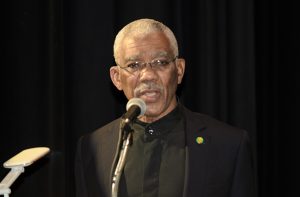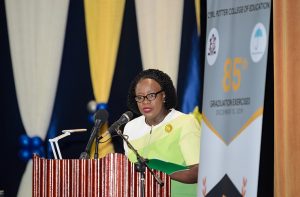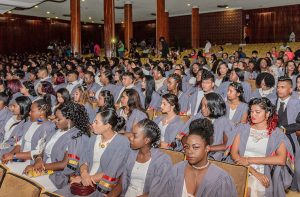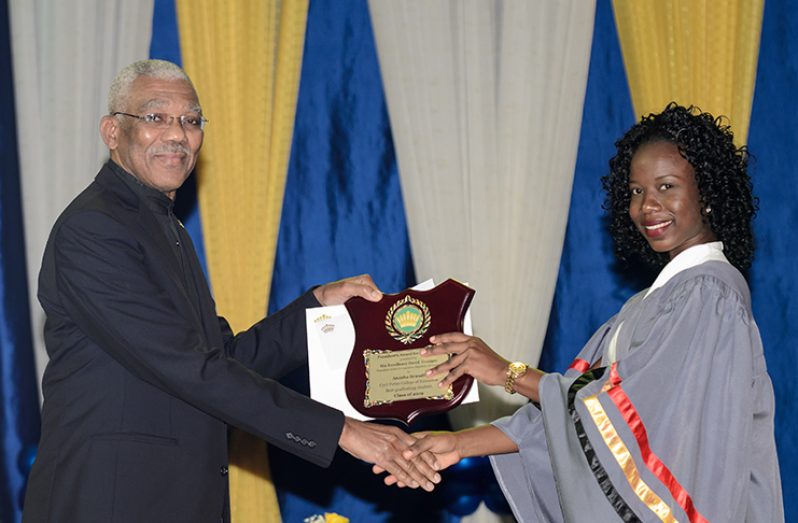— says President David Granger as 377 graduate from CPCE
TEACHERS are expected to be the engine that drives the nation and mould present and future generations with the skills needed for transformational change in Guyana.
This vision was shared by President David Granger, during his address on Friday, at the 85th graduation exercise of the Cyril Potter College of Education (CPCE), at the National Cultural Centre.

The graduation was held under the theme “Re-branding Teacher Education through verbal and visual identities”.
The CPCE teachers were drawn from the Turkeyen campus in Region Four; Rose Hall campus in Region Six and the new Anna Regina campus in Region Two.
Some 82 of the 377 graduates will be assigned to the early childhood level, 125 at the primary level and 170 at the secondary level.
The President noted that there will be no place for untrained teachers in the future of the education system.
He said teachers are key to a world-class education system and every child will have the opportunity to attend nursery, primary, secondary and university at the expense of the State.
Further, he said science education will be the driving force behind the expansion of communications and development in a Digital State and at the heart of the exploitation of natural resources.
He also said it is the bridge to economic transformation and preservation of the environment.
“The country will need an A to Z of science in economic transformation. We will need agronomists, architects, biologists, chemists, doctors, engineers, geologists, physicists’ and zoologist from A to Z, all are needed to help transforms this country, to establish science-based industries and to develop the ‘Green’ State and a Digital State,” the President said.
Training of teachers, he said, is vital for fulfilling the national mandate and noted that Guyana will emerge as an education nation, a nation characterised by every child being in school and every child graduating from secondary school.
This will result in Guyana becoming a highly-productive society since it will be a highly-skilled and educated workforce.
He noted too that Guyana will become a ‘Green’ State and emphasis will be placed on the preservation and protection of the environment and value-added production.
Guyana will also become a Digital State, the President said, noting that every region, village, community, household and government agency will benefit from ICT services.
Guyana will also benefit from petroleum production which will promote faster economic growth, greater employment and economic opportunities which will result in profound changes in education.

According to President Granger, every young person will have the ability to find employment while developing their skills and every region will have its own capital town, hospitals, college campus, own stadium, own botanical gardens.
The coastland and hinterland will be connected, making it possible to drive from Crabwood Creek, Berbice to Sand Creek, Rupununi.
AGENTS OF CHANGE
Education Minister, Dr. Nicolette Henry, congratulated the graduants and urged that they become agents of change.
“I have to be honest with you graduating class of 2019 that notwithstanding your certificates, your journey to success would be arduous and involve daily labour, and many selfless acts, the choices you have made and those that you will make will add up to your lasting legacy. And so we can never be satisfied with our latest achievements, many of you will go on to read for other degrees and enhance your skill sets in order to become all that you were created to be. You have to get up every morning and give of your best in your respective fields,” Dr. Henry told the graduating teachers.
The minster told the teachers that whether they were trained to be in nursery, primary or secondary classrooms, they must give of their best.
“I ask that you give of your best and give back and contribute to the life of this country. You will have setbacks, and you may have failures but you cannot allow that to define who you are, nor what you become.”
Dr. Henry continued: “I can share with you my own personal experience. I have not always succeeded, I have not always gotten it right, but I have always remained resolute and committed to getting better. I learn every day and I continue to benefit from mentorship, nurturing, guidance, and even criticism – so I can continue to grow, deliver and discharge my responsibilities in my current portfolio as minister of education.”
Minister Henry said having the right skills can make coping with changes at work and even in one’s personal environment easier.
“Those of you graduating today, let me say one of the greatest gifts you can give to yourself right here, right now, at this important moment in your life, is to decide without apology, to commit to the journey and not the outcome. The course of the journey will certainly impact both your output and your outcome,” the minister said.
She told the graduating class that productivity and growth should be their watchwords and producing more with less should be a concept that they should be familiar with.

Minister Henry also told the graduands that they are graduating at an interesting time, a time when many in education believe that soft skills development is just as or even more important than an academic degree.
In fact one of the major challenges facing the global education community, she said, is how to address simultaneously, the skills inequality and skills uncertainty.
“This paradox acknowledges that the current ways in which students are prepared reinforce the formal pedagogical structures that can prevent students from developing the breath of skills needed for 21st century life and therefore do not prepare them adequately for the skills uncertainty,” Minister Henry noted.
She said young people need more than traditional academic skills, noting that soft skills such as collaboration, problem-solving and creativity are critical in life and in the world of work.




.jpg)










